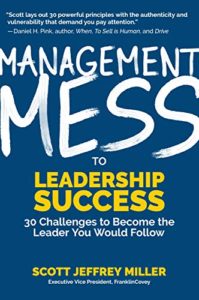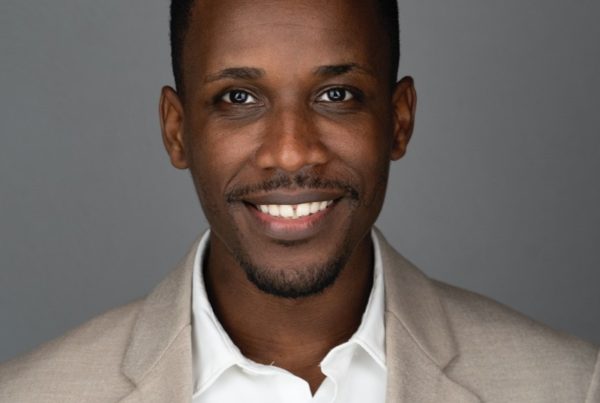Podcast: Play in new window | Download
Subscribe: RSS
How Can You Become a Leader That People Want To Follow?

Scott Miller
Scott Miller is the Executive Vice President of Thought Leadership at FranklinCovey. Co-founded by Dr. Stephen R. Covey, the author of the book The Seven Habits of Highly Effective People, FranklinCovey is one of the top leadership development companies in the world.
With over 30 years of leadership experience, Scott leads the strategy, development, and publication of FranklinCovey’s bestselling books on thought leadership, providing the framework for the company’s world-renowned content and solutions.
He is the host of On Leadership With Scott Miller, a weekly leadership webcast, podcast, and newsletter sponsored by FranklinCovey that features interviews with renowned business titans, authors, and thought leaders. The podcast is distributed to more than six million business leaders worldwide.
Scott is the author of Management Mess to Leadership Success: Become the Leader You Would Follow.
He is also the co-author of The Wall Street Journal bestseller, Everyone Deserves A Great Manager: The 6 Critical Practices for Leading a Team, released in October 2019.
What We Discuss With Scott Miller In This Episode
- Why he chose to write another leadership book
- Why not everyone should be a leader of people
- How to distinguish lack of ability to lead from self-doubt
- The leadership mindset
- Why top salespeople turned leaders are creating carnage across culture
- Leadership at a time of crisis
Transcript Highlights
Why Another Leadership Book
Scott thought most of the leadership books he had read were fairly academic. So he wanted to write a book that was in that sweet spot of being real, raw, and relatable and from someone who has been a leader of people from the front line up to the C-suite.
In the book, Scott outlined 30 challenges that leaders are going to face and it’s important they understand those as they take on a leadership role. Gone are the days where you see CEOs and C-suite leaders as not being relatable. They’re just like everybody else who has to deal with imposter syndrome.
Why Not Everyone Should Be a Leader of People
Too often in organizations, we promote the wrong people into leadership roles. Organizations wrongly hold leaders of people up as the necessary pinnacle of career success. There are a lot of phenomenal individual producers that just crush it because they want to contribute. They want to create. But they don’t want to lead people.
It takes a whole different level of commitment and interest in the success of others. The spotlight is off of you and on to others. And not everybody can naturally do that or wants to do that. But that being said, it doesn’t make them a bad person.
Therefore, in an organization, it’s perfectly fine to say that leadership is not the right path for you. A lot of people take great pride in seeing the fruits of their work immediately, and there’s nothing wrong with that. Because leadership is tough. It’s unrelenting and it can be unrewarding.
Having a Leadership Mindset
Do you have the mindset that your job is to get work done with and through other people? Because once you have that kind of leadership mindset, everything changes because you value relationships differently. You learn how to balance listening with speaking, and learn the necessity of coaching and creating capability in other people.
Everything can’t be urgent. So you can no longer work in an urgency mindset. You have to differentiate between what is important and what is urgent. Recognize that your job is to give people enough rope not to hang themselves, but to stretch their skills. You can’t be the smartest person in the room. You have to be the genius-maker of others, not the genius in the room.
Why Top Sales People Turned Leaders are Creating Carnage Across Culture
According to a Harvard Business Review study, the average age where someone is promoted into their first management position is age 30. Yet the average age that most people receive their first leadership development training is at age 42.
So well-intended people that had great careers are now wreaking havoc. They’re creating carnage across culture. And everybody’s being diminished as a result, including the person that was promoted.
Leadership at a Time of Crisis
- Leaders need to reframe their mindset to check-in, and not check on.
It’s not people that are the greatest asset of a company, but it’s the relationship. It’s all about relationships. People don’t quit leaders who love them. A high-trust relationship means to admit what you don’t know.
- Leaders need to be concise, consistent and recognize that change is highly emotional.
You have to appreciate how emotional change is and you might need to be treating each person differently.
Episode Resources
- Podcast: On Leadership With Scott Miller
- Book: Management Mess to Leadership Success: Become the Leader You Would Follow
Connect With Scott Miller and Franklin Covey
Did You Enjoy The Podcast?
If you enjoyed this episode please let us know! 5-star reviews for the Leaders Of Transformation podcast on Apple Podcasts, Spotify, Pandora or Stitcher are greatly appreciated. This helps us reach more purpose-driven entrepreneurs seeking to make a positive impact in the world. Thank you. Together, we make a difference!
Additional Episodes You May Like
- 345: Melissa Lamson: Managing Well in a Complex Business Environment
- 327: Sue Salvemini: Leading From Your Kitchen Table
- 321: Dr. Jeffrey Spahn: The Evolution of Leadership in the Midst Of Crisis
- 297: Craig Wheldon: Life and Leadership Lessons From A 2-Star General
- 118: Tiana Sanchez: Building Better Managers & Leaders In Today’s Marketplace
- 076: Blair Singer: Building A Championship Team










